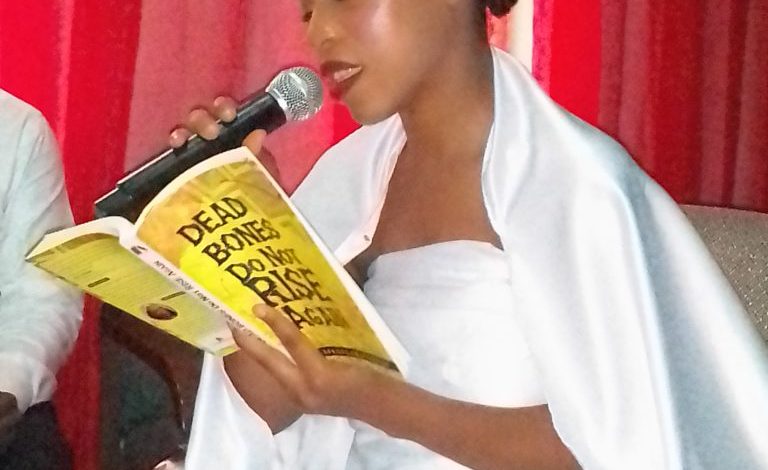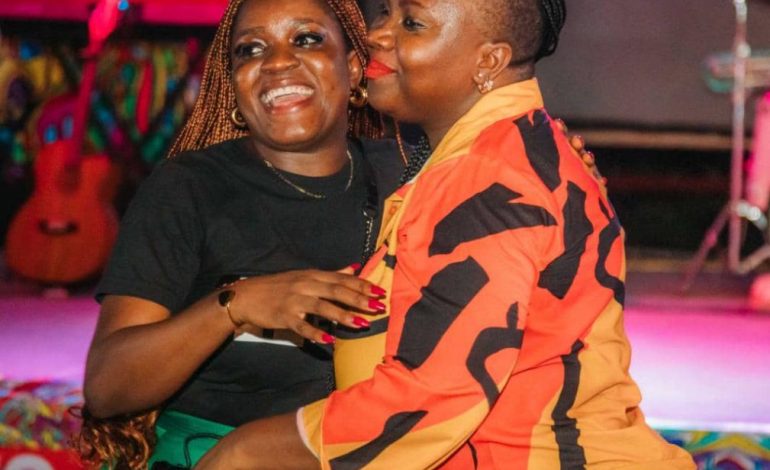
Contradictory spirituality among Nigerians defines debut novel at LABAF ‘22 launch
By Anote Ajeluorou
VENUE was a small room inside a museum. As the door opens, a man standing without a pulpit is preaching to your left, asking his congregation to say ‘Ameen’ to his many prayers of God’s blessings or words of exhortation. On the wall he’s facing, the name of the church is boldly written in curved letterings: Messiah Deliverance Ministries. But behind the man preaching or giving exhortation are the paraphernalia of a juju man or babalawo or dibia or obuo’s shrine, as your mother tongue calls men or women who use such articles of supernatural entities – vertical pieces of red and black cloths hanging down from the ceiling, a pot of ominous content, a black box on which is placed an orb of sorts, and cowry shells and other objects.
It was perhaps the greatest simulation of the inherent contradictions that beset many Africans for whom the duality of their Christian faith and ancestral indigenous religions find space and which will always conflict and fight for the salvation or damnation of their souls. Not fully Christians and never quite quitting their ancestral religious roots, they are torn between the two extremes in perhaps one of the world’s greatest metaphysical disorientation, of the half-man, half-child phenomenon. Preacher of the gospel of Christ by day in church, but patron of multiple African deities at night in shrines, this has become the lot of many in today’s African world. But how did we arrive at this dual religious adherence and profession? What is its import on the African psyche? Is this good? Is this bad? Or should there be a middle ground?

These are some of the questions Ifenna Grace Okeke tries to provide some answers in her debut novel, Dead Bones Do Not Rise Again (Purple Shelves). The scene described above was the venue for the launch of her novel at Freedom Park Museum, Lagos. And to complete the circle, the author appeared in an all-white attire like an acolyte to the river goddess from which abode ogbaje or other water spirits supposedly inhabit. And the man presiding over the phoney church-shrine and launch of the book is poet laureate, publisher and festival manager, Mr. Su’eddie Vershima Agema. The usher of this church-shrine is the publisher of Purple Shelves, Amarachukwu Chimeka. The congregation or audience was mostly guests of Lagos Book and Art Festival (LABAF) 2022 edition that had ‘Path to the Future’ as theme.
“This is more of a book that has something to do with the clash of religions. There’s this thing about many Nigerians, majorly the religious fanatics, who when they are sick will tell you, ‘I’m well in Jesus name!’ But you could see that the person is literally dying, or you ask them, ‘are you sick,’ and they are quick to say, ‘oh no, I can’t be sick, I’m strong.’ But he or she is actually sick and dying. So this book is about an encapsulation of what we see (around us in the name of religion). It’s not an exaggeration, because it’s actually what happens,” Okeke explained her motivation for the novel to her guests.
Although not in her novel, Okeke narrated a similar but stunning story of a Nigerian medical doctor in the UK, a Christian, who in her sleep every night, would have dreams about her people calling on her to return to serve their gods in the village. And this lady never had peace until she actually returned to her village to serve their village gods. “Now, that sounded like a contradiction in a country where everyone wants to ‘japa’ (to go abroad), but this medical professional is made to return just to serve her village deities,” Okeke said, as fitting but baffling metaphor to describe the inherent contradictions in the African psyche when it comes to religious beliefs.
According to Okeke, “This (my book) is not an advocacy for us to go back to our roots. No, no, no! This is not me saying we should become African traditional worshippers, but it’s something that we need to look into. So this book talks about it more in a humorous way; it also has a bit of love, romance; everything about emotions is there. You’re going to really love this book, not because I’m the one saying so.” Agema, who has read the novel also attested to its arresting narrative flare.
While writers generally have grand notions of writing to correct some ills in society and change it for the better, Okeke did not have such pretention about her writerly mission for Dead Bone Do Not Rise Again. Hers was quite simple and straight-forward: a quest for economic fortune through writing! She started writing because she needed the money that she could win in a literary contest her sister brought to her attention.
“The first thing that inspired me to write the book is money,” she said matter-of-factly. (General guffaw in the house). “Yes, it started with money. Money, as you know, answereth all things! But while I was writing, inspiration to change somethings about society also came in but that wasn’t the first consideration. It was my sister who called to tell me that there was a competition going on and asked if I was interested in submitting a manuscript. That was in my Youth Service in 208. At that point, I didn’t have a subject or plot or story in mind. But I after I started, I stopped writing immediately and didn’t come back to it until after a year. Along the way, I was then inspired to infuse something that I had noticed in (our) society. I have friends who would be dying of headache but they would say, ‘I’m strong in Jesus name.’ I asked several questions.”

Okeke, who described herself as ‘I’m a one-step-at-a-time person, has no illusion about how she expect critics to receive her book because of the subject she chose to write about saying, “My book is going to provoke a lot of questions, a lot of criticism, some in my favour and some not in my favour. It’s something that would prick (people’s) conscience.”
Of course, she never submitted her work for the literary contest that sparked her writerly instinct in the first place, because she’d not envisaged how rigorous it was to write a novel. But she would pick up the thread again after pressures from her sister and a friend who told her that her inability to pursue her passion to a logical end was a kind of slow ‘death.’ She didn’t want that sort of ‘death’, so she plodded on to the finishing line, and Dead Bones Do Not Rise Again is the result of her passion coming through at last.



